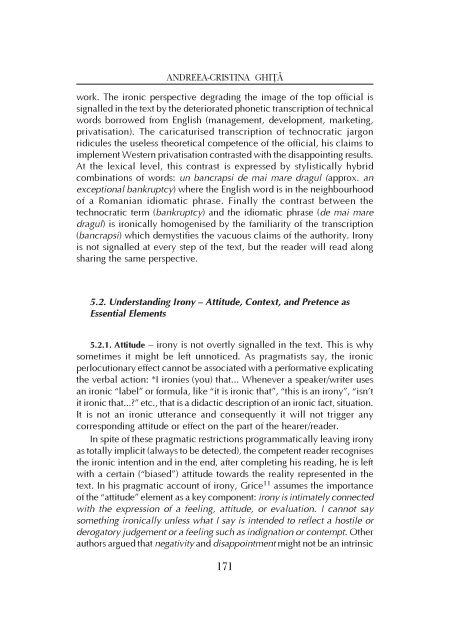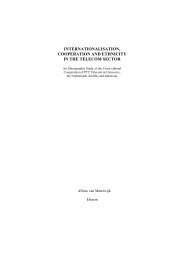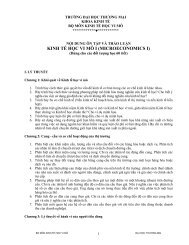- Page 1:
New Europe College Yearbook 1997-19
- Page 4 and 5:
Tipãrirea acestui volum a fost fin
- Page 6 and 7:
ANDREI STOICIU L’engagement polit
- Page 8 and 9:
Livres: Eminescu et la lyrique roum
- Page 10 and 11:
N.E.C. Yearbook 1997-1998 toutes le
- Page 12 and 13:
N.E.C. Yearbook 1997-1998 Objet d
- Page 14 and 15:
N.E.C. Yearbook 1997-1998 existenti
- Page 16 and 17:
N.E.C. Yearbook 1997-1998 panne de
- Page 18 and 19:
N.E.C. Yearbook 1997-1998 ainsi, en
- Page 20 and 21:
N.E.C. Yearbook 1997-1998 et de la
- Page 22 and 23:
N.E.C. Yearbook 1997-1998 du poète
- Page 24 and 25:
N.E.C. Yearbook 1997-1998 de crise
- Page 26 and 27:
N.E.C. Yearbook 1997-1998 Dès son
- Page 28 and 29:
N.E.C. Yearbook 1997-1998 vers de l
- Page 30 and 31:
N.E.C. Yearbook 1997-1998 lire l’
- Page 32 and 33:
N.E.C. Yearbook 1997-1998 dans son
- Page 34 and 35:
N.E.C. Yearbook 1997-1998 processus
- Page 36 and 37:
N.E.C. Yearbook 1997-1998 exemple d
- Page 38 and 39:
N.E.C. Yearbook 1997-1998 (apocalyp
- Page 40 and 41:
N.E.C. Yearbook 1997-1998 Appropria
- Page 42 and 43:
N.E.C. Yearbook 1997-1998 Bãlãnu
- Page 44 and 45:
N.E.C. Yearbook 1997-1998 de son oe
- Page 46 and 47:
N.E.C. Yearbook 1997-1998 textes in
- Page 48 and 49:
N.E.C. Yearbook 1997-1998 sentiment
- Page 50 and 51:
N.E.C. Yearbook 1997-1998 poète na
- Page 52 and 53:
N.E.C. Yearbook 1997-1998 représen
- Page 54 and 55:
N.E.C. Yearbook 1997-1998 suivre (d
- Page 56 and 57:
N.E.C. Yearbook 1997-1998 lequel pl
- Page 58 and 59:
N.E.C. Yearbook 1997-1998 de la dro
- Page 60 and 61:
N.E.C. Yearbook 1997-1998 dans l’
- Page 62 and 63:
N.E.C. Yearbook 1997-1998 ... Et su
- Page 64 and 65:
N.E.C. Yearbook 1997-1998 BIBLIOGRA
- Page 66 and 67:
N.E.C. Yearbook 1997-1998 AMOSSY, R
- Page 68 and 69:
N.E.C. Yearbook 1997-1998 GILLIS, J
- Page 70 and 71:
N.E.C. Yearbook 1997-1998 SZEMERE,
- Page 72 and 73:
Erster Preis, Internationaler Kompo
- Page 74 and 75:
N.E.C. Yearbook 1997-1998 daß dies
- Page 76 and 77:
N.E.C. Yearbook 1997-1998 gedämpft
- Page 78 and 79:
N.E.C. Yearbook 1997-1998 Kann man
- Page 80 and 81:
N.E.C. Yearbook 1997-1998 um Miniat
- Page 82 and 83:
N.E.C. Yearbook 1997-1998 Wenn es W
- Page 84 and 85:
N.E.C. Yearbook 1997-1998 - die unm
- Page 86 and 87:
N.E.C. Yearbook 1997-1998 Unterschi
- Page 88 and 89:
N.E.C. Yearbook 1997-1998 Komponist
- Page 90 and 91:
N.E.C. Yearbook 1997-1998 Empfinden
- Page 92 and 93:
N.E.C. Yearbook 1997-1998 wird in W
- Page 94 and 95:
N.E.C. Yearbook 1997-1998 der sofor
- Page 96 and 97:
N.E.C. Yearbook 1997-1998 musikalis
- Page 98 and 99:
N.E.C. Yearbook 1997-1998 zur Defin
- Page 100 and 101:
N.E.C. Yearbook 1997-1998 hervorgeh
- Page 102 and 103:
N.E.C. Yearbook 1997-1998 Berge von
- Page 104 and 105:
N.E.C. Yearbook 1997-1998 In andere
- Page 106 and 107:
N.E.C. Yearbook 1997-1998 Von hier
- Page 108 and 109:
N.E.C. Yearbook 1997-1998 Unterwelt
- Page 110 and 111:
N.E.C. Yearbook 1997-1998 bei Straw
- Page 112 and 113:
N.E.C. Yearbook 1997-1998 15. Es ha
- Page 114 and 115:
N.E.C. Yearbook 1997-1998 114
- Page 116 and 117:
Books: Great Philosophers of the Wo
- Page 118 and 119:
N.E.C. Yearbook 1997-1998 3. The Ci
- Page 120 and 121: N.E.C. Yearbook 1997-1998 children
- Page 122 and 123: N.E.C. Yearbook 1997-1998 rapid eco
- Page 124 and 125: N.E.C. Yearbook 1997-1998 and more
- Page 126 and 127: N.E.C. Yearbook 1997-1998 different
- Page 128 and 129: N.E.C. Yearbook 1997-1998 kinds. Th
- Page 130 and 131: N.E.C. Yearbook 1997-1998 Taking in
- Page 132 and 133: N.E.C. Yearbook 1997-1998 rights ed
- Page 134 and 135: N.E.C. Yearbook 1997-1998 the fact
- Page 136 and 137: N.E.C. Yearbook 1997-1998 of educat
- Page 138 and 139: N.E.C. Yearbook 1997-1998 regime co
- Page 140 and 141: N.E.C. Yearbook 1997-1998 way, in k
- Page 142 and 143: N.E.C. Yearbook 1997-1998 NOTES 1.
- Page 144 and 145: N.E.C. Yearbook 1997-1998 rather as
- Page 146 and 147: N.E.C. Yearbook 1997-1998 concept o
- Page 148 and 149: N.E.C. Yearbook 1997-1998 35. As Hi
- Page 150 and 151: N.E.C. Yearbook 1997-1998 the same
- Page 152 and 153: N.E.C. Yearbook 1997-1998 of commun
- Page 154 and 155: N.E.C. Yearbook 1997-1998 FONTE, Jo
- Page 156 and 157: N.E.C. Yearbook 1997-1998 TORNEY-PU
- Page 158 and 159: 158
- Page 160 and 161: N.E.C. Yearbook 1997-1998 tradition
- Page 162 and 163: N.E.C. Yearbook 1997-1998 has the s
- Page 164 and 165: N.E.C. Yearbook 1997-1998 to a real
- Page 166 and 167: N.E.C. Yearbook 1997-1998 might be
- Page 168 and 169: N.E.C. Yearbook 1997-1998 or in his
- Page 172 and 173: N.E.C. Yearbook 1997-1998 property
- Page 174 and 175: N.E.C. Yearbook 1997-1998 The negat
- Page 176 and 177: N.E.C. Yearbook 1997-1998 helps the
- Page 178 and 179: N.E.C. Yearbook 1997-1998 Tradition
- Page 180 and 181: N.E.C. Yearbook 1997-1998 irony: el
- Page 182 and 183: N.E.C. Yearbook 1997-1998 King’s
- Page 184 and 185: N.E.C. Yearbook 1997-1998 original
- Page 186 and 187: N.E.C. Yearbook 1997-1998 and irony
- Page 188 and 189: N.E.C. Yearbook 1997-1998 The last
- Page 190 and 191: N.E.C. Yearbook 1997-1998 In print
- Page 192 and 193: N.E.C. Yearbook 1997-1998 The repro
- Page 194 and 195: N.E.C. Yearbook 1997-1998 The direc
- Page 196 and 197: N.E.C. Yearbook 1997-1998 of irony
- Page 198 and 199: N.E.C. Yearbook 1997-1998 5. Splich
- Page 200 and 201: N.E.C. Yearbook 1997-1998 REFERENCE
- Page 202 and 203: Books in joint authorship, papers,
- Page 204 and 205: N.E.C. Yearbook 1997-1998 This kind
- Page 206 and 207: N.E.C. Yearbook 1997-1998 Used in t
- Page 208 and 209: N.E.C. Yearbook 1997-1998 apparitio
- Page 210 and 211: N.E.C. Yearbook 1997-1998 viewed [c
- Page 212 and 213: N.E.C. Yearbook 1997-1998 the jump
- Page 214 and 215: N.E.C. Yearbook 1997-1998 …Whatev
- Page 216 and 217: N.E.C. Yearbook 1997-1998 to fill t
- Page 218 and 219: N.E.C. Yearbook 1997-1998 Most defi
- Page 220 and 221:
N.E.C. Yearbook 1997-1998 processes
- Page 222 and 223:
N.E.C. Yearbook 1997-1998 simplific
- Page 224 and 225:
Barth’s definition of ethnicity:
- Page 226 and 227:
N.E.C. Yearbook 1997-1998 The distr
- Page 228 and 229:
N.E.C. Yearbook 1997-1998 if knowle
- Page 230 and 231:
N.E.C. Yearbook 1997-1998 our tende
- Page 232 and 233:
N.E.C. Yearbook 1997-1998 has led t
- Page 234 and 235:
N.E.C. Yearbook 1997-1998 These con
- Page 236 and 237:
N.E.C. Yearbook 1997-1998 things, t
- Page 238 and 239:
N.E.C. Yearbook 1997-1998 [it] has
- Page 240 and 241:
N.E.C. Yearbook 1997-1998 and try t
- Page 242 and 243:
N.E.C. Yearbook 1997-1998 NOTES 1.
- Page 244 and 245:
N.E.C. Yearbook 1997-1998 38. Hawke
- Page 246 and 247:
N.E.C. Yearbook 1997-1998 cognition
- Page 248 and 249:
N.E.C. Yearbook 1997-1998 could hav
- Page 250 and 251:
N.E.C. Yearbook 1997-1998 160. Wies
- Page 252 and 253:
N.E.C. Yearbook 1997-1998 Barrett 1
- Page 254 and 255:
N.E.C. Yearbook 1997-1998 Cohen 199
- Page 256 and 257:
N.E.C. Yearbook 1997-1998 Glazer an
- Page 258 and 259:
N.E.C. Yearbook 1997-1998 Kossack 1
- Page 260 and 261:
Sackett 1985 Sackett 1986 Sackett 1
- Page 262 and 263:
N.E.C. Yearbook 1997-1998 Wiessner
- Page 264 and 265:
Hunderte von Studien, Vorworte, Ess
- Page 266 and 267:
N.E.C. Yearbook 1997-1998 konfronti
- Page 268 and 269:
N.E.C. Yearbook 1997-1998 sich weni
- Page 270 and 271:
N.E.C. Yearbook 1997-1998 262, 293,
- Page 272 and 273:
N.E.C. Yearbook 1997-1998 Nun reimt
- Page 274 and 275:
N.E.C. Yearbook 1997-1998 Der Mitte
- Page 276 and 277:
N.E.C. Yearbook 1997-1998 zeigt der
- Page 278 and 279:
N.E.C. Yearbook 1997-1998 den Verfa
- Page 280 and 281:
N.E.C. Yearbook 1997-1998 “ruinö
- Page 282 and 283:
N.E.C. Yearbook 1997-1998 theologis
- Page 284 and 285:
N.E.C. Yearbook 1997-1998 nicht dem
- Page 286 and 287:
N.E.C. Yearbook 1997-1998 gantz Gö
- Page 288 and 289:
N.E.C. Yearbook 1997-1998 theoretis
- Page 290 and 291:
N.E.C. Yearbook 1997-1998 1.3.2. Ü
- Page 292 and 293:
N.E.C. Yearbook 1997-1998 “Ach we
- Page 294 and 295:
N.E.C. Yearbook 1997-1998 schwer fa
- Page 296 and 297:
N.E.C. Yearbook 1997-1998 Teilnehme
- Page 298 and 299:
N.E.C. Yearbook 1997-1998 zwischen
- Page 300 and 301:
N.E.C. Yearbook 1997-1998 10. “In
- Page 302 and 303:
N.E.C. Yearbook 1997-1998 43. Es se
- Page 304 and 305:
N.E.C. Yearbook 1997-1998 CERTEAU,
- Page 306 and 307:
306
- Page 308 and 309:
Livres: L’ensemble de musique tra
- Page 310 and 311:
N.E.C. Yearbook 1997-1998 Chapitre
- Page 312 and 313:
N.E.C. Yearbook 1997-1998 façon di
- Page 314 and 315:
N.E.C. Yearbook 1997-1998 Les femme
- Page 316 and 317:
N.E.C. Yearbook 1997-1998 Chapitre
- Page 318 and 319:
N.E.C. Yearbook 1997-1998 Le modèl
- Page 320 and 321:
N.E.C. Yearbook 1997-1998 délimit
- Page 322 and 323:
N.E.C. Yearbook 1997-1998 Dans un c
- Page 324 and 325:
N.E.C. Yearbook 1997-1998 Chapitre
- Page 326 and 327:
N.E.C. Yearbook 1997-1998 contraint
- Page 328 and 329:
N.E.C. Yearbook 1997-1998 Autrement
- Page 330 and 331:
N.E.C. Yearbook 1997-1998 tant qu
- Page 332 and 333:
N.E.C. Yearbook 1997-1998 Il ressor
- Page 334 and 335:
N.E.C. Yearbook 1997-1998 confèren
- Page 336 and 337:
N.E.C. Yearbook 1997-1998 dans la v
- Page 338 and 339:
N.E.C. Yearbook 1997-1998 en automn
- Page 340 and 341:
N.E.C. Yearbook 1997-1998 et les fe
- Page 342 and 343:
N.E.C. Yearbook 1997-1998 tard que
- Page 344 and 345:
N.E.C. Yearbook 1997-1998 probablem
- Page 346 and 347:
N.E.C. Yearbook 1997-1998 de vue to
- Page 348 and 349:
N.E.C. Yearbook 1997-1998 la renden
- Page 350 and 351:
N.E.C. Yearbook 1997-1998 estrade e
- Page 352 and 353:
N.E.C. Yearbook 1997-1998 ceatã (n
- Page 354 and 355:
N.E.C. Yearbook 1997-1998 contrã (
- Page 356 and 357:
N.E.C. Yearbook 1997-1998 glas (n.
- Page 358 and 359:
N.E.C. Yearbook 1997-1998 volonté
- Page 360 and 361:
N.E.C. Yearbook 1997-1998 ethnomusi
- Page 362 and 363:
N.E.C. Yearbook 1997-1998 Annexe II
- Page 364 and 365:
N.E.C. Yearbook 1997-1998 personne,
- Page 366 and 367:
N.E.C. Yearbook 1997-1998 32. Spera
- Page 368 and 369:
N.E.C. Yearbook 1997-1998 RÃDULESC
- Page 370 and 371:
370
- Page 372 and 373:
N.E.C. Yearbook 1997-1998 les quart
- Page 374 and 375:
N.E.C. Yearbook 1997-1998 3. Banlie
- Page 376 and 377:
N.E.C. Yearbook 1997-1998 parfois d
- Page 378 and 379:
N.E.C. Yearbook 1997-1998 - 1992 (D
- Page 380 and 381:
N.E.C. Yearbook 1997-1998 2) (1728)
- Page 382 and 383:
4.2 Les Données Objectives N.E.C.
- Page 384 and 385:
N.E.C. Yearbook 1997-1998 et peu so
- Page 386 and 387:
N.E.C. Yearbook 1997-1998 c) Le pav
- Page 388 and 389:
N.E.C. Yearbook 1997-1998 La mortal
- Page 390 and 391:
N.E.C. Yearbook 1997-1998 Le chôma
- Page 392 and 393:
5. Périphérie et Urbanisme N.E.C.
- Page 394 and 395:
N.E.C. Yearbook 1997-1998 celles-ci
- Page 396 and 397:
N.E.C. Yearbook 1997-1998 6. Banlie
- Page 398 and 399:
N.E.C. Yearbook 1997-1998 conflits.
- Page 400 and 401:
N.E.C. Yearbook 1997-1998 modèles
- Page 402 and 403:
N.E.C. Yearbook 1997-1998 eux même
- Page 404 and 405:
N.E.C. Yearbook 1997-1998 temps de
- Page 406 and 407:
N.E.C. Yearbook 1997-1998 Les noms
- Page 408 and 409:
N.E.C. Yearbook 1997-1998 Les tziga
- Page 410 and 411:
N.E.C. Yearbook 1997-1998 Tous ces
- Page 412:
N.E.C. Yearbook 1997-1998 C’est u
- Page 415 and 416:
LUANA-IRINA STOICA de tous mais han
- Page 417 and 418:
LUANA-IRINA STOICA la famille. Les
- Page 419 and 420:
LUANA-IRINA STOICA On prend des lib
- Page 421 and 422:
LUANA-IRINA STOICA laideur, à la c
- Page 423 and 424:
LUANA-IRINA STOICA dettes, pauvret
- Page 425 and 426:
LUANA-IRINA STOICA dérisoire - des
- Page 427 and 428:
LUANA-IRINA STOICA 14. Le désir d
- Page 429 and 430:
LUANA-IRINA STOICA de lecteurs qui
- Page 431 and 432:
LUANA-IRINA STOICA BIBLIOGRAPHIE AN
- Page 433 and 434:
LUANA-IRINA STOICA OLSZEWSKI, G. -
- Page 435 and 436:
Criterion (an 1934) Curentul Dimine
- Page 437 and 438:
ANDREI STOICIU Né en 1970, à Buca
- Page 439 and 440:
L’engagement Politique au Nom de
- Page 441 and 442:
ANDREI STOICIU Moyen Age et un poè
- Page 443 and 444:
ANDREI STOICIU L’aspiration à l
- Page 445 and 446:
ANDREI STOICIU une grande différen
- Page 447 and 448:
ANDREI STOICIU que dans l’affirma
- Page 449 and 450:
ANDREI STOICIU des réflexions int
- Page 451 and 452:
ANDREI STOICIU faudrait ajouter à
- Page 453 and 454:
ANDREI STOICIU des intellectuels. C
- Page 455 and 456:
ANDREI STOICIU à une sphère relat
- Page 457 and 458:
ANDREI STOICIU immodérés ; ou plu
- Page 459 and 460:
ANDREI STOICIU sur la légitimité
- Page 461 and 462:
ANDREI STOICIU l’implication dire
- Page 463 and 464:
ANDREI STOICIU et établir les réf
- Page 465 and 466:
ANDREI STOICIU allocations de reche
- Page 467 and 468:
ANDREI STOICIU Comité Helsinki APA
- Page 469 and 470:
ANDREI STOICIU du groupe, le philos
- Page 471 and 472:
ANDREI STOICIU se sont contentés d
- Page 473 and 474:
ANDREI STOICIU service de la consol
- Page 475 and 476:
ANDREI STOICIU matériel… la drog
- Page 477 and 478:
ANDREI STOICIU condamnant le discou
- Page 479 and 480:
ANDREI STOICIU A l’opposé, d’a
- Page 481 and 482:
ANDREI STOICIU NOTES 1. Roderic A.
- Page 483 and 484:
ANDREI STOICIU 51. D. BARBU, ibid.,
- Page 485 and 486:
ANDREI STOICIU 102. O. PALER, ”Do
- Page 487 and 488:
ION TÃNÃSESCU Geboren 1964 in Hor
- Page 489 and 490:
Die Intentionale Inexistenz. Ein Kr
- Page 491 and 492:
ION TÃNÃSESCU Das ist der Zusamme
- Page 493 and 494:
ION TÃNÃSESCU der Auffassung der
- Page 495 and 496:
ION TÃNÃSESCU Erkannten im Erkenn
- Page 497 and 498:
ION TÃNÃSESCU 2. Die Analyse der
- Page 499 and 500:
ION TÃNÃSESCU welches das Objekt
- Page 501 and 502:
ION TÃNÃSESCU Alle hier angeführ
- Page 503 and 504:
ION TÃNÃSESCU 3. Der Status des P
- Page 505 and 506:
ION TÃNÃSESCU die Physik als Wiss
- Page 507 and 508:
ION TÃNÃSESCU Einteilung der Seel
- Page 509 and 510:
ION TÃNÃSESCU Bibliothek bewahrte
- Page 511 and 512:
ION TÃNÃSESCU und der Unterscheid
- Page 513 and 514:
ION TÃNÃSESCU erscheint die Idee
- Page 515 and 516:
ION TÃNÃSESCU scholastischen Gebr
- Page 517 and 518:
ION TÃNÃSESCU ANMERKUNGEN * Zum S
- Page 519 and 520:
ION TÃNÃSESCU 18. Ebd., 207. Dies
- Page 521 and 522:
ION TÃNÃSESCU dieses Objekt als
- Page 523 and 524:
ION TÃNÃSESCU Subjekt der sensiti
- Page 525 and 526:
ION TÃNÃSESCU 93. Nach Brentano i
- Page 527 and 528:
ION TÃNÃSESCU und Brentano, a.a.O
- Page 529 and 530:
N.E.C. Yearbook 1997-1998 • const
- Page 531 and 532:
N.E.C. Yearbook 1997-1998 Finanþar
- Page 533 and 534:
N.E.C. Yearbook 1997-1998 NEW EUROP
- Page 535 and 536:
N.E.C. Yearbook 1997-1998 trip to a
- Page 537 and 538:
N.E.C. Yearbook 1997-1998 Founder o
- Page 539 and 540:
N.E.C. Yearbook 1997-1998 • Culti
- Page 541 and 542:
N.E.C. Yearbook 1997-1998 dont les




